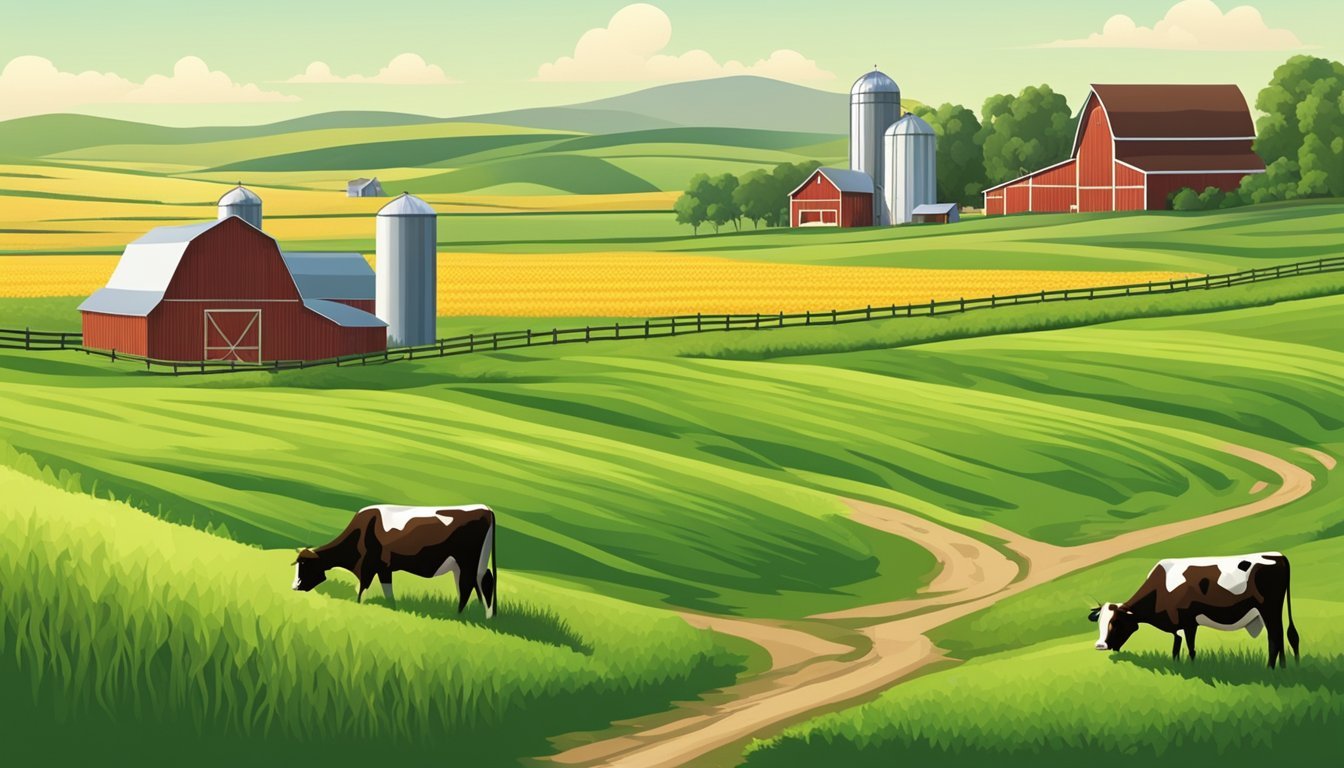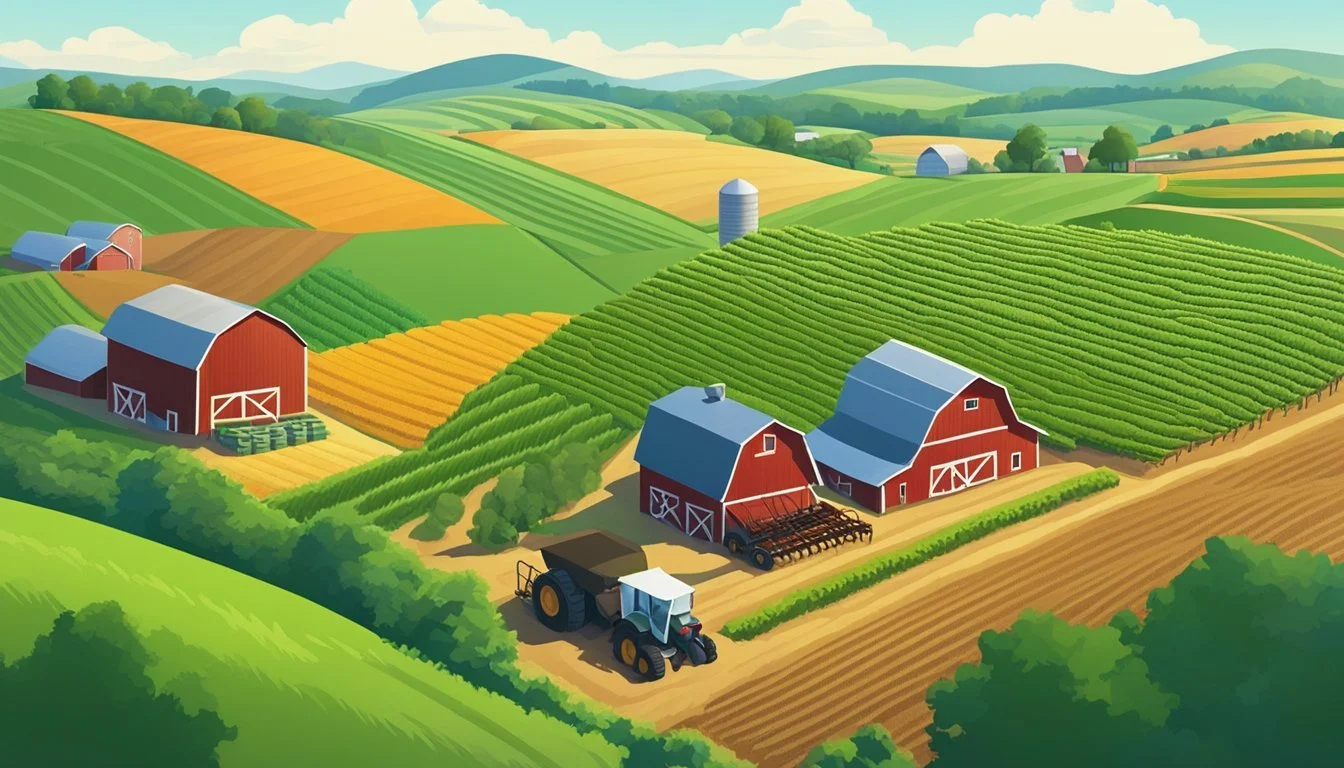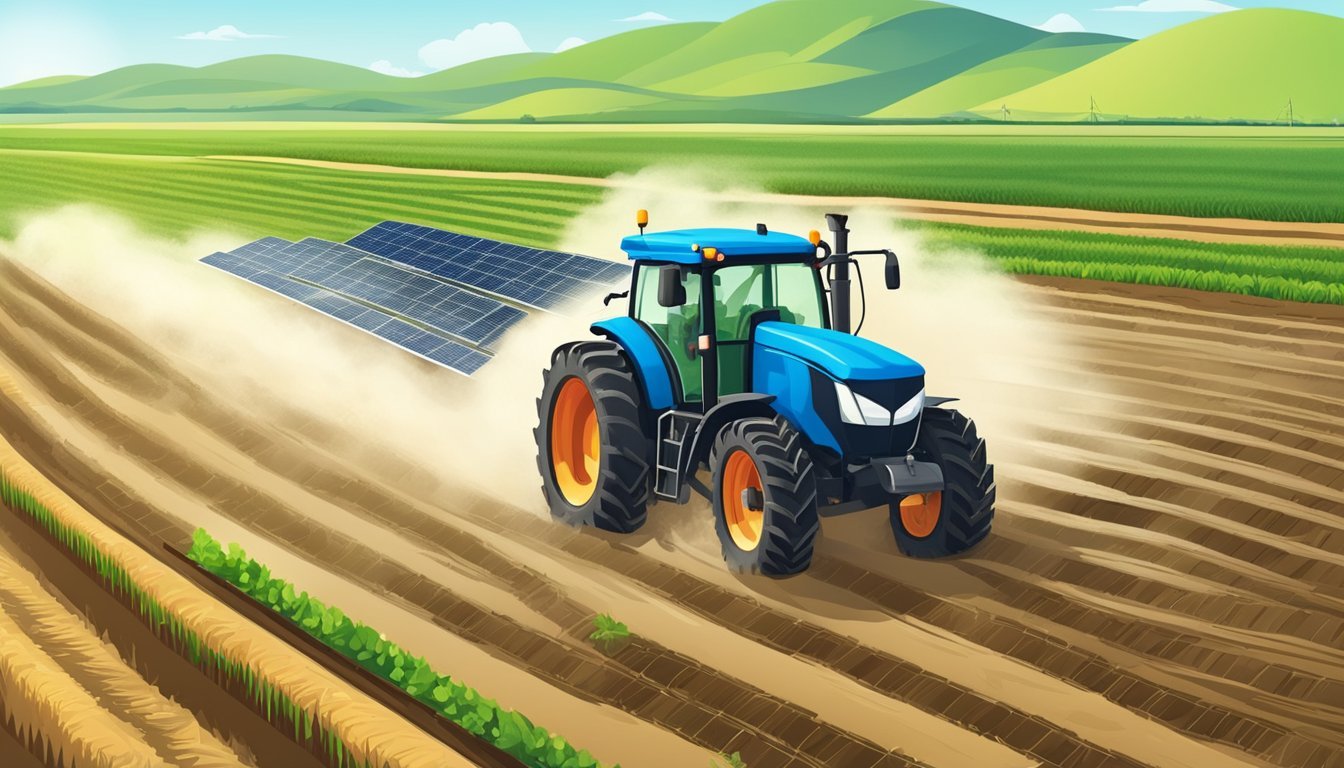Guide to Farming in Arkansas
Essential Tips for Successful Agriculture
This Article is Part of Our State by State Farming Guide
Arkansas boasts a rich agricultural heritage, positioning it as a key player in the United States' farming industry. The state's diverse landscapes, which range from the fertile grounds of the Mississippi Delta to the undulating terrain of the Ozarks, create optimal conditions for a variety of crops and livestock. This varied topography, coupled with a favorable climate, allows Arkansas to sustain a myriad of farming operations, producing significant quantities of rice, soybeans, (how long do soybeans last?) cotton, and poultry—key commodities that have a substantial impact on the state's economy.
With agriculture being the largest industry in Arkansas, it contributes approximately $16 billion annually to the state's economy. Arkansas farmers and ranchers benefit from a range of resources provided by local agencies, including the Arkansas Department of Agriculture and the USDA Farm Service Agency, which focus on policy development, business assistance, and the implementation of practices that ensure competition in national and international markets while maintaining natural resource conservation. These institutions are instrumental in fostering an environment where agriculture can thrive and are dedicated to aiding farmers in managing their businesses effectively, from obtaining a farm number to understanding tax codes and applying for grants.
Furthermore, the state offers a bounty of agricultural products thanks in part to its climate, which permits a progressive calendar of fruit and vegetable harvests, ensuring fresh produce is available throughout the year. This not only serves the consumer market within the state but also contributes to Arkansas's standing as a major exporter of certain crops. Through this integration of natural advantages and supportive infrastructure, farming in Arkansas stands out as a testament to the state's dedication to this foundational sector.
Arkansas Agricultural Overview
Arkansas’s agriculture plays a pivotal role in both the state's identity and its economy, encompassing a wide range of activities from cultivation to livestock breeding and significant contributions to the industry and production sectors.
Land and Climate
Arkansas's diverse geography ranges from the Mississippi Delta's fertile plains to the Ozarks' rolling hills, providing a rich tapestry of land for agricultural use. The state enjoys a temperate climate with four distinct seasons, which supports a variety of agricultural practices. Irrigation is widely used, particularly in the eastern part of the state, to enhance crop production.
Total Acres for Farming: 14 million (approx.)
Primary Uses: Agriculture, forestry
Crops and Livestock
Arkansas produces a substantial array of crops and maintains varied livestock operations:
Major Crops: Soybeans, cotton, rice, corn, wheat
Fruits and Vegetables: Varied, including peaches and tomatoes
Livestock: Cattle, broilers (chickens for meat), turkeys
Farming is predominantly conducted in rural areas, with family-owned farms contributing significantly to the production of Arkansas's agricultural products.
Agriculture Economy and Business
The business of agriculture in Arkansas is a cornerstone of the state’s economy, contributing billions to its financial system.
Economic Contribution: Over $19 billion
Average Farm Size: 308 acres
Farm Revenue and Expenses:
Average yearly farm revenue: $160,270
Average yearly farm expenses: $124,324
Arkansas agriculture ensures not only the production of essential food and fiber but also supports rural communities and sustains the natural resources within the state.
Farming Practices and Management
Effective farming practices and management are foundational to the success and sustainability of agriculture in Arkansas. Farmers are encouraged to adopt strategies that support the longevity of their land and resources, promote efficient water use, and carefully plan land use to optimize agricultural output.
Sustainable Agriculture
Farmers are adopting sustainable agricultural techniques to address the pressing concerns of soil conservation and environmental health. They implement a diverse range of cultivation practices, including crop rotation and the use of cover crops, to maintain soil fertility and reduce erosion. In addition, agroforestry practices, which combine the cultivation of trees and shrubs with crops or livestock, offer opportunities to enhance biodiversity and ecosystem services. Community support for sustainability initiatives is vital, with programs offering technical and financial assistance to those who participate.
Irrigation and Water Management
Irrigation systems in Arkansas must be carefully managed to mitigate the effects of a changing climate and ensure water conservation. Farmers often use advanced irrigation techniques, such as drip or pivot systems, to maximize water efficiency. Planning for water use is critical, not just for individual farms but for the wider farming community. Crop insurance ensures that farmers are protected against losses due to unpredictable weather patterns that may affect their water supply.
Land Use Planning
Land use planning is essential, particularly as the state's agriculture industry contends with the pressures of an aging farmer population and the need to support dairy and poultry sectors. Farmers are encouraged to develop a well-thought-out plan that takes into consideration the compatibility of land with different types of agricultural practices. Research-driven programs provide farmers with the necessary technical assistance for effective planning, while conserving land for future farming needs. Moreover, integrating conservation trees and plants can protect crops and livestock from adverse weather and promote ecological balance.
Arkansas Farm Bureau and Regulatory Environment
The Arkansas Farm Bureau plays a crucial role in supporting the state's agricultural producers by addressing regulatory affairs and ensuring that policies are met with informed compliance.
Roles and Support
The Arkansas Farm Bureau stands as a pivotal organization for agricultural producers in the state. It oversees commodity divisions and regulatory affairs related to the agriculture sector. The Bureau assists in navigating the complexities of environmental and market regulations. Individuals such as the Vice President of Commodity and Regulatory Affairs are crucial in managing issues concerning areas like swine, poultry, and environmental topics. Directors for different commodities, such as cotton and soybeans, provide tailored support in their respective fields.
Compliance and Regulations
In terms of compliance and regulations, the Bureau guides producers through a myriad of state laws and regulations, ensuring that agriculture in Arkansas thrives while adhering to necessary legal frameworks. Important documents such as "Pest Control Law & Rules" or "Arkansas Laws on Plants and Seeds" play an essential role in this regard. Regulations on pests, diseases, and management acts like the Arkansas Boll Weevil Suppression Eradication Act are specific policies covered by the Bureau. The Division of Agriculture conducts research and extension work to promote best practices and to help farmers comply with regulations effectively.
Livestock and Commodities
In Arkansas, livestock and commodity production are critical sectors, with beef and dairy, alongside poultry and swine farming, playing significant roles in the state's agricultural economy.
Beef and Dairy Production
Arkansas ranchers manage a substantial number of cattle across the state, contributing to both beef and dairy markets. Beef production is characterized by its focus on quality breeding and herd management, aimed at supplying both local and national demand. Dairy farms, although smaller in comparison, emphasize efficient milk production, ensuring a steady supply of dairy products.
Beef Production:
Herd size and ranching practices are tailored to maximize the quality and quantity of beef.
Arkansas farmers prioritize sustainable breeding and raising techniques to maintain herd health.
Dairy Production:
Smaller scale operations focus on high-quality milk output.
Efficient land and resource management ensures the viability of the dairy sector.
Poultry and Swine
Poultry is a cornerstone of Arkansas's agricultural output, with the state being one of the leading producers nationally. Broiler chickens, layers, and turkeys are the primary focus in poultry farming, with many operations implementing advanced technology for feed efficiency and disease control.
Swine farming, producing pork products, maintains a presence in Arkansas agriculture. It leverages efficient breeding programs and nutritional science to optimize pork production while adhering to health and environmental regulations.
Poultry Production:
Includes broilers, layers, and turkeys with a strong emphasis on maintaining animal health and food safety.
Arkansas's poultry industry is supported by high-tech feed operations and cutting-edge processing facilities.
Swine Production:
Concentrates on breeding and raising hogs for a variety of pork products.
Efficiency in swine production is achieved through modern farming techniques and strict biosecurity measures.
Crop Production
Arkansas's agriculture is diverse, focusing on both staple crops like rice and soybeans and specialty items such as fruits and vegetables. The emphasis on safety and best practices ensures that produce is top-quality for consumers.
Grains and Fiber Crops
In the realm of grains, Arkansas stands out as a leading producer of rice, earning the title "Rice Capital of the United States." The state's climate and soil conditions favor soybeans, making them a significant cash crop. A sizeable portion of the state's soybeans are utilized for animal feed, cooking oil, and biofuels.
Rice: Predominant varieties cultivated
Soybeans: Key cash crop, used for animal feed and more
Cotton: Arkansas ranks third in U.S. production, a testament to the state's fertile grounds that are ideal for this fiber crop.
Corn: Largely used within the state as poultry feed
Wheat: Another important grain crop
Specialty Crops and Orchards
Specialty crops and orchards contribute to Arkansas's agricultural diversity. Fruit trees, including those that yield peaches and apples, are integral to the region's farming.
Tomatoes: One of the numerous vegetables cultivated, widely produced in Arkansas.
Organic agriculture is gaining traction, with a movement towards specialty crops.
Nursery products, stemming from the demand for both decorative and productive plants.
The only state with commercial edamame production signifies Arkansas's unique position in specialty agriculture.
Emphasis on safe practices in fruit and vegetable production, ensuring high-quality fresh produce.
Arkansas's commitment to varied and safe crop production plays a critical role in the state's economy, showcasing a blend of traditional grains and innovative agricultural ventures.
Market and Trade
Arkansas's agricultural market plays a vital role in the state's economy, engaging a network of producers, processors, and retailers. This section discusses the infrastructure and economic principles driving the trade of Arkansas's farm products.
Selling and Distribution
Farmers in Arkansas have a variety of avenues for selling and distributing their products. Retail markets, including farmers' markets and local grocery stores, serve as direct interfaces between producers and consumers. Distribution systems are in place to connect Arkansas's farm products with wider commercial markets both domestically and internationally. Advanced marketing strategies and the assistance of the state's Small Business & Technology Development Center enable producers to optimize their sales.
When considering processors, Arkansas's farmers benefit from partnerships that add value to raw agricultural produce through stages of transformation, readying them for market shelves and enhancing economic development.
Agricultural Economics
The economic landscape of Arkansas agriculture is diverse and robust, contributing significantly to the state's financial health. The state's agricultural economy spans from raw commodities to value-added products.
Arkansas Agricultural Products:
Soybeans
Rice
Poultry
Cotton
Livestock
These key products reflect the prosperity of the market and its capacity to support both the local and national economy. Economic development initiatives prioritize sustainable practices while expanding market opportunities. This ensures the state's agricultural sector remains competitive, benefiting from agricultural economics research and extension programs.
Agricultural Communities and Development
In Arkansas, agricultural communities are cultivated through education initiatives aimed at leadership development and by enhancing rural areas to foster economic growth and utilize natural resources sustainably.
Education and Leadership Development
Arkansas invests in its agricultural future by focusing on education and leadership development within farming communities. The University of Arkansas Division of Agriculture operates offices across all 75 counties, offering resources and programs that cultivate a knowledgeable workforce. Programs are tailored to both the new and seasoned farmer, promoting cutting-edge agricultural practices and leadership skills necessary for community and economic development.
Workshops and Training: Direct support for farmers and community leaders through specialized training sessions.
Youth Programs: Initiatives such as 4-H to engage youth in agriculture, fostering the next generation of farmers.
Leadership Programs: Development courses for agricultural professionals aimed at enhancing decision-making and management competencies.
Rural Community Enhancement
The enhancement of rural communities in Arkansas is also pivotal, as they serve as the backbone of the state's agricultural output. Efforts are made to ensure these communities are equipped with the necessary infrastructure and opportunities for growth.
Agritourism: Integration of tourist attractions in rural areas, providing economic incentives and preserving local culture and heritage.
Farmer’s Markets: Support and promotion of local markets, reinforcing the local food supply chain and community health.
Natural Resource Management: Practices to balance farming needs with conservation of soil, water, and biodiversity to ensure long-term sustainability.
Economic Initiatives: Investments into rural areas to stimulate job creation and economic stability, making agrarian communities attractive for living and working.
By focusing on these key areas, Arkansas's agricultural communities are developing sustainably, ensuring the state remains competitive and its resources are conserved for future generations.
Conservation and Environment
In Arkansas, conservation and the protection of natural resources are paramount. The state's approach encompasses a synergy between agriculture, forestry, and horticulture to ensure sustainable practices that benefit both the landscape and the economy.
Conservation practices safeguard the farmland, maintaining soil health and water quality. Agrichemical Handling Facilities are implemented to reduce environmental risks, containing any spillages and preventing soil or water contamination.
Tree and Plant Preservation: Vital to the ecosystem, trees and plants are protected through conservation programs. These efforts support biodiversity and serve as a backbone for various species, enhancing forestry and aquaculture.
Forestry Industry: It's a significant sector in Arkansas, integrating conservation measures to protect tree populations while also fueling economic activity.
Natural Resources: Conservation of these resources ensures that species thrive and natural landscapes are preserved for future generations.
Horticulture and forestry initiatives often intersect to promote a landscape that supports varied agriculture and wildlife. This holistic view facilitates responsible land management and contributes to Arkansas's reputation for environmental stewardship.
The Natural Resources Conservation Service (NRCS) delivers technical assistance, guiding landowners and operators to enhance environmental quality and conserve water and soil. Farmers are encouraged to adopt environmentally safe processing and aquaculture practices.
By balancing the needs of the forestry industry and agriculture, Arkansas demonstrates a dedication to preserving its rich natural heritage while advancing economically.
Infrastructure and Technology
Arkansas's agricultural infrastructure plays a pivotal role in supporting its farming community. Investments in irrigation systems are foundational, ensuring that water resources are managed efficiently—an essential factor given the state's variable climate. This infrastructure underpins the successful cultivation of Arkansas's diverse crops, from rice to soybeans.
Technological advancements further enhance the state's farming capabilities. Precision agriculture technologies, for example, allow for more accurate planting and harvesting, reducing waste and increasing yields. Drones and satellite imaging are also used for crop monitoring, leading to timely interventions and better resource management.
The state's commitment to innovation is reflected in its research initiatives. Universities and public institutions conduct research on hybrid seeds, soil health, and pest management, providing the farming community with technical assistance and access to the latest findings. Such partnerships help farmers stay competitive and sustainable.
Local food systems have been strengthened through the Resilient Food Systems Infrastructure (RFSI) program, backed by a $5.6 million grant from the United States Department of Agriculture (USDA). The program enhances planning and infrastructure with an eye towards more resilient local food supply chains.
Key Entities Role in Arkansas Agriculture Irrigation Systems Efficient water resource management Technology Precision in planting, harvesting, crop monitoring Research Development of agriculture through studies and innovations Technical Assistance Guidance and implementation of modern agricultural practices
Arkansas's agricultural scene thrives in part due to a steadfast focus on infrastructure and modernization, ensuring community progress and food security for all.
Extension Services and Support Programs
Arkansas's agricultural sector benefits from extensive support programs and extension services that provide technical assistance, practical research, and educational opportunities. These programs, often spearheaded by academic institutions and government agencies, offer valuable resources for enhancing production and conservation practices in Arkansas agriculture.
University of Arkansas System Division of Agriculture plays a pivotal role. Its Cooperative Extension Service offers a gateway to research-based knowledge, covering a myriad of topics from crop management to sustainable farming practices. They run crop verification programs which demonstrate effective production techniques to local farmers.
The Arkansas Farm Resources within the Arkansas Land Conservation Assistance Network lists resources specific to the region, such as:
Agronomists and Crop Advisers
Conservation Groups and Associations
Consultants - Land
Federal and State Tax Incentives and Programs
FSA Local Offices
The network offers a comprehensive guide, especially for beginning farmer organizations and professionals, ensuring they receive up-to-date, scientifically-backed insights.
Additionally, the Small Farm Program of the University of Arkansas at Pine Bluff Cooperative Extension Program targets smaller scale producers. Focusing on vegetable crops, row crops, and livestock, the program provides assistance to those who are socially disadvantaged or have limited resources, ensuring broader access to the state's agricultural wealth.
Lastly, federal involvement via the USDA offers crucial support, including tax incentives and developmental programs that align with state efforts to bolster the farming community. Programs like the FSA Local Offices provide a direct line to USDA resources and technical assistance, crucial for navigating the complexities of farming in today's environment.
Challenges and Opportunities
In Arkansas's agricultural landscape, farmers encounter distinct challenges and opportunities that shape their livelihoods. Factor such as aging demographics and climate variability play pivotal roles in the state's farming success.
Aging Farmer Demographics
The agricultural sector in Arkansas is observing an increase in the average age of farmers, reflecting a nationwide trend toward aging farmer demographics. This escalation poses a challenge in terms of succession planning and maintaining a skilled labor force for the future. However, it also presents an opportunity for younger generations to bring in new technologies and innovative farming practices, which can enhance productivity and sustainability.
Climate Change and Weather Events
Farmers in Arkansas are increasingly facing challenges related to climate change and severe weather events. The state's humid subtropical climate makes it prone to:
Flooding
Drought
Tornadoes
These extreme weather conditions can lead to substantial damage to crops and infrastructure, threatening farm viability. Nonetheless, such challenges encourage the adoption of more resilient farming practices and drive innovations in weather forecasting and disaster preparedness, potentially providing farmers with better tools to mitigate risks associated with climate variability.











